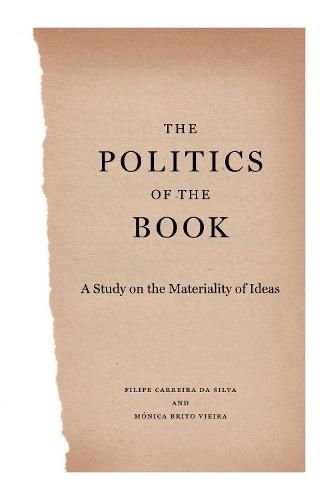Readings Newsletter
Become a Readings Member to make your shopping experience even easier.
Sign in or sign up for free!
You’re not far away from qualifying for FREE standard shipping within Australia
You’ve qualified for FREE standard shipping within Australia
The cart is loading…






This title is printed to order. This book may have been self-published. If so, we cannot guarantee the quality of the content. In the main most books will have gone through the editing process however some may not. We therefore suggest that you be aware of this before ordering this book. If in doubt check either the author or publisher’s details as we are unable to accept any returns unless they are faulty. Please contact us if you have any questions.
It is impossible to separate the content of a book from its form. In this study, Filipe Carreira da Silva and Monica Brito Vieira expand our understanding of the history of social and political scholarship by examining how the entirety of a book mediates and constitutes meaning in ways that affect its substance, appropriation, and reception over time.
Examining the evolving form of classic works of social and political thought, including W. E. B. Du Bois’s The Souls of Black Folk, G. H. Mead’s Mind, Self, and Society, and Karl Marx’s 1844 Economic and Philosophic Manuscripts, Carreira da Silva and Brito Vieira show that making these books involved many hands. They explore what publishers, editors, translators, and commentators accomplish by offering the reading public new versions of the works under consideration, examine debates about the intended meaning of the works and discussions over their present relevance, and elucidate the various ways in which content and material form are interwoven. In doing so, Carreira da Silva and Brito Vieira characterize the editorial process as a meaning-producing action involving both collaboration and an ongoing battle for the importance of the book form to a work’s disciplinary belonging, ideological positioning, and political significance.
Theoretically sophisticated and thoroughly researched, The Politics of the Book radically changes our understanding of what doing social and political theory-and its history-implies. It will be welcomed by scholars of book history, the history of social and political thought, and social and political theory.
$9.00 standard shipping within Australia
FREE standard shipping within Australia for orders over $100.00
Express & International shipping calculated at checkout
This title is printed to order. This book may have been self-published. If so, we cannot guarantee the quality of the content. In the main most books will have gone through the editing process however some may not. We therefore suggest that you be aware of this before ordering this book. If in doubt check either the author or publisher’s details as we are unable to accept any returns unless they are faulty. Please contact us if you have any questions.
It is impossible to separate the content of a book from its form. In this study, Filipe Carreira da Silva and Monica Brito Vieira expand our understanding of the history of social and political scholarship by examining how the entirety of a book mediates and constitutes meaning in ways that affect its substance, appropriation, and reception over time.
Examining the evolving form of classic works of social and political thought, including W. E. B. Du Bois’s The Souls of Black Folk, G. H. Mead’s Mind, Self, and Society, and Karl Marx’s 1844 Economic and Philosophic Manuscripts, Carreira da Silva and Brito Vieira show that making these books involved many hands. They explore what publishers, editors, translators, and commentators accomplish by offering the reading public new versions of the works under consideration, examine debates about the intended meaning of the works and discussions over their present relevance, and elucidate the various ways in which content and material form are interwoven. In doing so, Carreira da Silva and Brito Vieira characterize the editorial process as a meaning-producing action involving both collaboration and an ongoing battle for the importance of the book form to a work’s disciplinary belonging, ideological positioning, and political significance.
Theoretically sophisticated and thoroughly researched, The Politics of the Book radically changes our understanding of what doing social and political theory-and its history-implies. It will be welcomed by scholars of book history, the history of social and political thought, and social and political theory.